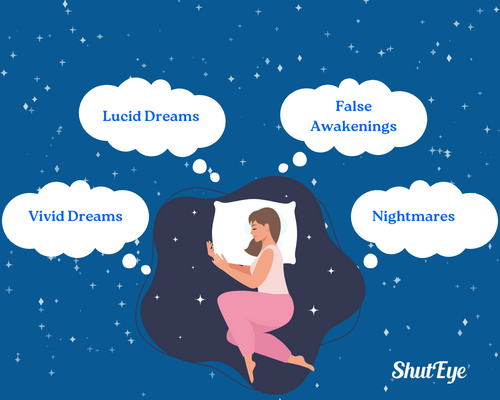


Have you ever experienced a life filled with an abundance of wealth and being in complete bliss, only to be jolted awake by the alarm, realizing with a sigh, “Ah, it was only just a dream”?
At some point, we would have all experienced what it is like to dream. While it is still fresh in our minds, we would replay the scenes and wonder why did we dream that and whether there were any meanings to it. Perhaps, some may also wonder why do we dream, at all? In this article, we will unpack together what dreams are and why we even experience it.

Dreams are a series of images, thoughts and emotions created by the mind during sleep. While visual imagery is the most common dream experience, dreams can also involve other senses [3]. In fact, not all individuals dream the same!
Some may find themselves dreaming in color or black and white. Some may find themselves being able to smell, taste or feel in their dream.
Dream can happen anytime while we are sleeping but most dreams occur during rapid eye movement (REM) sleep. This stage is where we are more likely to experience intense dreaming and have vivid dreams. Before we can really start to understand how dreaming works, we first need to know about the sleep cycle and the process of how we sleep.
Sleep consists of five stages: the wake stage, stage 1, stage 2, stage 3 and REM stage. These sleep stages are considered to be under two categories which are non-rapid eye movement (NREM) sleep and rapid eye movement (REM) sleep.
Stage 1 to Stage 3 are classified under NREM sleep. Each stage gradually guides you deeper into sleep until you reach the deepest stage, Stage 3 [1]. Past this, its the REM sleep stage.
During REM sleep, the human brain activity is much more intense and active. This phenomenon explains the increased likelihood of vivid or bizarre dreams during REM sleep, often incorporating elements from waking life.

The reason why we dream still remains a mystery for many scientists. However, there are a number of theories that scientists have come up with, as possible reasons to why we dream during sleep.

At the end of the day, dreams serve as a window to how our minds work. While the exact purpose of dreaming remains elusive, one thing is clear: dreams play a crucial role in our mental and emotional well-being and helps us to navigate the complexities of life.

There are different types of dreams that you can experience as you sleep but the more common ones are vivid dreams, lucid dreams, false awakenings and nightmares.
Vivid dreams are dreams that are so detailed and vibrant, we still remember them upon waking up. Often times, these dreams tend to feel extremely real.
Lucid dreams are dreams whereby the dreamer is aware of the fact that they are dreaming. During this, the dreamer is able to control what is happening in their dream.
False awakenings are dreams where the dreamer thinks that that they are awake when in fact, they are still asleep and dreaming.
Nightmares are disturbing dreams that could possibly wake the dreamer up. It typically induces feelings of fear, anxiety and distress.
The question of why we dream remains a subject of debate among scientists and psychologists, with various theories proposing different explanations. Some suggest that dreams serve as a mechanism for processing emotions and memories, while others argue that they facilitate problem-solving and creativity.
Dream content encompasses a vast array of experiences, ranging from fantastical or bizarre scenarios to mundane ones. Some of the common dreams that people can have are falling, being chased, losing teeth and death. While it is subjective, there are possible explanations and meanings behind these dreams. For example, falling dreams may signify a loss of control or fear of failure, while being chased could represent avoidance of unresolved issues.
Thus, our dreams can be a reflection of what is in our minds.
Most times, standard dreams do not affect sleep quality. Dreams are considered to be a normal occurrence with the exception of nightmares.
Research suggests that people who experience distressing dreams such as nightmares, experience sleep problems like disturbed sleep and daytime sleepiness [2]. Especially for those with frequent nightmares, they fear going back to sleep or they have difficulty in falling asleep again.
Sometimes, it may feel as if we do not have dreams. I have experienced that myself. I go to bed with my eyes closed and the next thing I know, it is morning. I have no recollection of dreaming at any point, whatsoever.
So, then comes the question, “do we really dream every night?“. Maybe, some of us just do not dream at all. The reality is this: everyone of us dream every night.

Some possible reasons as to why you think you do not dream could be that you are not in REM sleep for a long period of time or that you are constantly waking up from REM sleep.
Thus, it is certain that you do dream each night but you just do not know it.
It is possible, however, to keep track of whether you are in REM sleep long enough to experience dreaming with the help of sleep tracking apps like ShutEye. ShutEye® is a patented sleep tracking app that comes with informative features like sleep stages, dream record and many more.
Forgetting our own dreams can be attributed to a number of factors. One reason is the brain’s transition from sleep to wakefulness, during which dream memories fades rapidly. As the brain shifts from being in a dream state to waking state, the focus will be to process incoming sensory information. Thus, making dream memories inaccessible.
Additionally, when dreams are fragmented or have abstract imagery, it is much easier to forget. Other factors that affects dream recall include sleep disturbances, stress, and distractions upon waking. Overall, the complex interaction between neurological processes and environmental factors contributes to the phenomenon of forgetting dreams.
To sum up, dreaming is a universal phenomenon that occurs during sleep. While it is still a huge debate amongst sleep experts and psychologists on why we actually dream, there are different theories that seek to explain this intriguing aspect of human experience.
Regardless of this purpose, it remains clear that dreaming is an integral part of the human sleep cycle. It something that happens every night and a good indicator of whether we are getting a good night’s sleep!
Dreams can feel real and vivid due to the brain’s activity during REM sleep. During this stage, the brain is active, resembling wakefulness which contributes to how realistic the dream is.
It really depends. Dream usually happens during REM sleep, which happens in cycles throughout the night. Dreams can last from a few minutes to about 20 to 30 minutes as the sleep stages become progressively deeper.
Dreams come during sleep as a result of the brain’s activity. During REM sleep, the thalamus becomes active and sends images, sounds and other sensations to your brain cortex. These things then fill and become part of dreams.
The reason why we have poor dream recall and forget them really quickly is because of the brain’s transition from sleep to wakefulness. When we wake up during a NREM stage of sleep, we are more likely to forget as dream activity is a lot less intense.
[1] Patel, A., Reddy, V., Shumway, K., et al. (2024) Physiology, Sleep Stages [online]. Treasure Island (FL): StatPearls Publishing. Available at: https://www.ncbi.nlm.nih.gov/books/NBK526132/
[2] Paul, F., Schredl, M., & Alpers, G. W. (2015) Nightmares affect the experience of sleep quality but not sleep architecture: an ambulatory polysomnographic study. Borderline personality disorder and emotion dysregulation, 2, 3. https://doi.org/10.1186/s40479-014-0023-4
[3] Suni, E. (2023) Dreams [online]. Available at: https://www.sleepfoundation.org/dreams

